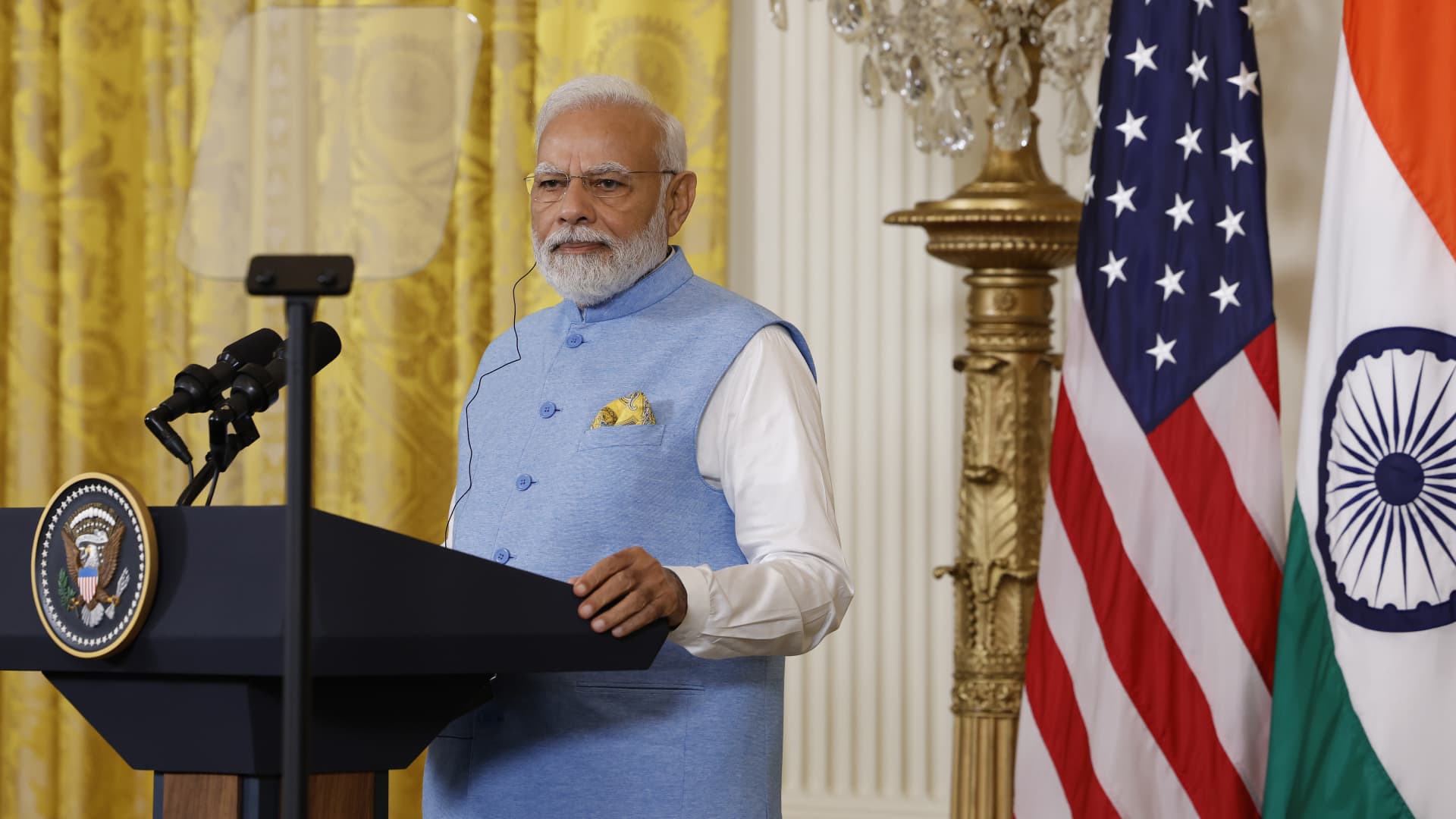Indian Prime Minister Narendra Modi has made efforts to attract investments from American semiconductor companies to his country.
Anna Moneymaker | Getty Images
Chief executives of some of the top semiconductor firms in the United States praised India’s technology sector during an event attended by Prime Minister Narendra Modi. India, the world’s fifth-largest economy, is positioning itself as a global chip powerhouse.
The CEOs of Micron and Cadence, along with senior executives from Applied Materials and AMD, joined Modi on stage at SemiconIndia to discuss their investments in India’s chip market. Ajit Manocha, CEO of U.S.-based industry body SEMI, also attended the event.
“For the first time in India’s history, geopolitics, domestic policies, and private sector capacity are aligned in India’s favor to become a player in semiconductor production,” said Manocha during a keynote speech. “We will look back at the year 2023 as a milestone year in which things began to take shape.”
The presence of major chip firms at the event highlights India’s aspirations to become a major hub for semiconductors, alongside countries such as the United States, Taiwan, and South Korea.
India’s chip strategy consists of two major parts. The first part involves attracting foreign firms to establish operations and invest in the country. The second part focuses on forming alliances with key semiconductor nations like the United States.
New Delhi has introduced supportive policies for the semiconductor sector, including a $10 billion incentive plan for the industry, which is open to foreign firms. Prime Minister Modi also expressed a commitment to collaborate with the United States on semiconductors and other areas during his visit to the country last month.
At SemiconIndia, the American chip firms discussed their investments in India and announced new ones, highlighting India’s emphasis on attracting foreign companies. AMD, for example, plans to invest around $400 million in India over the next five years, including the establishment of a new campus in Bangalore that will be the company’s largest design center.
“India teams will be pivotal in advancing AI machine learning and both hardware and software capabilities,” said Mark Papermaster, CTO of AMD, during a keynote speech.
Last month, Micron announced plans to set up a semiconductor assembly and testing facility in the state of Gujarat, India, with a total investment of up to $825 million.
“We are hopeful that this investment will help catalyze other investments in the sector, strengthen indigenous manufacturing capability, encourage innovation, and support broader job creation,” said Sanjay Mehrotra, CEO of Micron.
Despite facing setbacks, such as Foxconn pulling out of a joint venture with Vedanta to set up a semiconductor and display production plant in India, the event showcased the continued interest of companies like Foxconn in investing in India. Foxconn’s chairman, Young Liu, expressed his ambition to invest $2 billion in India over the next five years.
Anil Agarwal, Chair of the Vedanta Group, also confirmed the company’s commitment to semiconductors and its efforts to partner with world-class technology providers in the field.
India’s Challenges
While the event with prominent CEOs highlighted India’s potential in the semiconductor industry, the country still faces challenges in certain areas. For example, India has the potential to attract packaging and testing operations, which require relatively low-skilled labor and high capital investment. However, major Taiwanese firms have not yet established a presence in this segment of the market due to issues such as lack of policy consistency and high import tariffs.
In terms of foundries, which are involved in the actual manufacturing of semiconductors, India has struggled to find good technology partners. The failed chip manufacturing tie-up between Vedanta and Foxconn, for instance, relied on technology from a European semiconductor firm.
Nevertheless, analysts point to India’s large domestic market, supportive policies, and incentives as reasons for optimism in the country’s chip market. Prime Minister Modi also emphasized India’s strength in skilled engineers and designers and the country’s potential as a vibrant and unified market.
Denial of responsibility! VigourTimes is an automatic aggregator of Global media. In each content, the hyperlink to the primary source is specified. All trademarks belong to their rightful owners, and all materials to their authors. For any complaint, please reach us at – [email protected]. We will take necessary action within 24 hours.


